|
|
|
Sort Order |
|
|
|
Items / Page
|
|
|
|
|
|
|
| Srl | Item |
| 1 |
ID:
103388
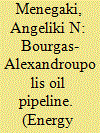

|
|
|
|
|
| Publication |
2011.
|
| Summary/Abstract |
This paper employs Muthoo's bargaining principles/prerequisites for an effective bargaining result (Muthoo (2000). A Non-Technical Introduction to Bargaining Theory, World Economics 1(2): 145-166) to decide whether Greece and Bulgaria can form a successful energy coalition. Motivation for this is the proposed construction of the crude oil pipeline from the Bulgarian port Burgas to the Greek Aegean port of Alexandroupolis. The reason Turkey is the third country in the analysis despite its current non-membership in this venture, is that: (i) Turkey offers to host a competitive route of the pipeline, (ii) It is a transit, neighboring country to Greece forming an important geopolitical triangle together with Greece and Bulgaria and (iii) co-operates separately with Bulgaria and Greece in other energy pipelines. Therefore, the three countries engage to interwining energy and geopolitical futures. Whether B-A oil pipeline will be implemented or not, will be due to a mix of bargaining procedures. The paper shows that Muthoo's principles/prerequisites for an effective bargaining result, through their constituents (selected economy and energy figures and characteristics), are fulfilled by Greece and Bulgaria. A broader coalition with the inclusion of Turkey might also be permissible and promising based on this theory.
|
|
|
|
|
|
|
|
|
|
|
|
|
|
|
|
| 2 |
ID:
175253


|
|
|
|
|
| Summary/Abstract |
Spatial setback rules are a common form of oil and gas regulation worldwide - they require minimum distances between oil and gas operations and homes and other sensitive locations. While setbacks can reduce exposure to potential harms associated with oil and gas production, they can also cause substantial quantities of oil and gas resources to be unavailable for extraction. Using both theoretical modeling and spatial analysis with GIS tools on publicly available data, we determine oil and gas resource loss under different setback distances, focusing on Colorado counties as a case study. We show that increasing setbacks results in small resource loss for setbacks up to 1500 feet, but resource loss quickly increases with longer setbacks. Approximately $4.5 billion in annual resource revenues would be lost in Colorado under 2500-foot setbacks, a distance recently proposed in Colorado Proposition 112 and California AB 345.
|
|
|
|
|
|
|
|
|
|
|
|
|
|
|
|
| 3 |
ID:
117241


|
|
|
|
|
| Publication |
2013.
|
| Summary/Abstract |
Biomass is increasingly being considered as a feedstock to provide a clean and renewable source of energy in the form of both liquid fuels and electric power. In the United States, the biofuels and biopower industries are regulated by different policies and have different drivers, which impact the maximum price the industries are willing to pay for biomass. This article describes a dynamic computer simulation model that analyzes future behavior of bioenergy feedstock markets given policy and technical options. The model simulates the long-term dynamics of these markets by treating advanced biomass feedstocks as a commodity and projecting the total demand of each industry, as well as the market price over time. The model is used for an analysis of the United States bioenergy feedstock market that projects supply, demand, and market price given three independent buyers: domestic biopower, domestic biofuels, and foreign exports. With base-case assumptions, the biofuels industry is able to dominate the market and meet the federal Renewable Fuel Standard (RFS) targets for advanced biofuels. Further analyses suggest that United States bioenergy studies should include estimates of export demand in their projections, and that GHG-limiting policy would partially shield both industries from export dominance.
|
|
|
|
|
|
|
|
|
|
|
|
|
|
|
|
| 4 |
ID:
076774


|
|
|
|
|
| Publication |
2007.
|
| Summary/Abstract |
Iran has pursued an ambitious nuclear program with the declared goal of long-term energy independence. While this is a worthwhile and generally accepted national planning objective, it is clear that Iran's nuclear program as now structured will not achieve this goal, and in fact may delay it by diverting capital and other resources from projects that would address pressing current energy sector problems and contribute to ultimate energy independence for Iran.
|
|
|
|
|
|
|
|
|
|
|
|
|
|
|
|
| 5 |
ID:
119839


|
|
|
|
|
| Publication |
2013.
|
| Summary/Abstract |
Argentina is one of the world's largest biodiesel producers and the largest exporter, using soybeans as feedstock. Using a computable general equilibrium model that explicitly represents the biofuel industry, this study carries out several simulations on two sets of issues: (i) international markets for biofuel and feedstock, such as an increase in prices of soybean, soybean oil, and biodiesel, and (ii) domestic policies related to biofuels, such as an introduction of biofuel mandates. Both sets of issues can have important consequences to the Argentinean economy. The simulations indicate that increases in international prices of biofuels and feedstocks would increase Argentina's gross domestic product and social welfare. Increases in international prices of ethanol and corn also can benefit Argentina, but to a lesser extent. The domestic mandates for biofuels, however, would cause small losses in economic output and social welfare because they divert part of biodiesel and feedstock from exports to lower-return domestic consumption. An increase in the export tax on either feedstock or biodiesel also would lead to a reduction in gross domestic product and social welfare, although government revenue would rise.
|
|
|
|
|
|
|
|
|
|
|
|
|
|
|
|
| 6 |
ID:
108764
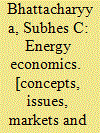

|
|
|
|
|
| Publication |
Verlag, Springer, 2011.
|
| Description |
xxvi, 721p.
|
| Standard Number |
9780857292674, hbk
|
|
|
|
|
|
|
|
|
|
|
|
Copies: C:1/I:0,R:0,Q:0
Circulation
| Accession# | Call# | Current Location | Status | Policy | Location |
| 056395 | 333.7/BHA 056395 | Main | On Shelf | General | |
|
|
|
|
| 7 |
ID:
108766


|
|
|
|
|
| Publication |
Heidelberg, Springer, 2011.
|
| Description |
xxx, 322p.
|
| Standard Number |
9783642138461
|
|
|
|
|
|
|
|
|
|
|
|
Copies: C:1/I:0,R:0,Q:0
Circulation
| Accession# | Call# | Current Location | Status | Policy | Location |
| 056392 | 333.7/WEI 056392 | Main | On Shelf | General | |
|
|
|
|
| 8 |
ID:
098658


|
|
|
|
|
| Publication |
London, Cambridge Univ Press, 1981.
|
| Description |
xiii, 442p.Paperback
|
| Standard Number |
0521281601
|
|
|
|
|
|
|
|
|
|
|
|
Copies: C:1/I:0,R:0,Q:0
Circulation
| Accession# | Call# | Current Location | Status | Policy | Location |
| 025652 | 333.7/EDE 025652 | Main | On Shelf | General | |
|
|
|
|
| 9 |
ID:
093520
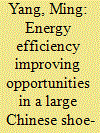

|
|
|
|
|
| Publication |
2010.
|
| Summary/Abstract |
Energy consumption and energy intensity reduction opportunities are quite different from one enterprise to another. It is necessary to understand how much energy is used at individual enterprise, where the most energy is consumed and what the best opportunities are to invest in energy efficiency. Auditing energy efficiency was recently undertaken in one of the top 1000 largest Chinese enterprises. The objectives of this paper are to fill a gap in the literature of auditing energy efficiency for a Chinese manufacturing enterprise and to share the audited energy efficiency results. This paper concludes that if the enterprise invests USD 1.9 million to improve energy efficiency, the investment will be recovered in about 18 months. The net present value of the investment would be about USD 9.8 million at a discount rate of 12%. The investment will reduce a large amount of energy consumption at the enterprise based on its figures in 2008, including 15% of electricity, 40% of fuel oil, and 54% of diesel. Carbon reduction is also very cost-effective. Investment of one dollar in the enterprise will help cut carbon emission by 7.95 kg per year and generate $5.3 net revenue in the economic lifetime of the invested technology.
|
|
|
|
|
|
|
|
|
|
|
|
|
|
|
|
| 10 |
ID:
176762


|
|
|
|
|
| Summary/Abstract |
Government support for the ongoing use of fossil fuels has polarised public opinion in Australia regarding the country's transition to low carbon energy generation. Despite this, polls indicate a desire for more meaningful engagement in the global energy transition amongst the Australian populace, which has stimulated a growing interest in Community Owned Renewable Energy (CORE). This study used a questionnaire based on the Theory of Planned Behaviour (TPB) to evaluate intention to invest in a CORE project that would be sited in Queensland, Australia. The analysis also sought to identify the considerations that would have the greatest association with this intention. 67% of respondents indicated an inclination to invest in the project and the mean intention score was 5.0 out of a possible maximum of 7 in favour of investing. This mean was relatively stable across almost all demographic sub-categories for gender, age, employment and income. Beliefs related to the community benefits that the initiative would provide were the most reliable attitudinal predictor of intention to invest. The findings concur with other studies that indicate widespread support for renewables amongst Australians and which suggest that “not in my back yard” (NIMBY) concerns are not a significant influence on negative attitudes towards renewable energy in Australia.
|
|
|
|
|
|
|
|
|
|
|
|
|
|
|
|
| 11 |
ID:
091584


|
|
|
|
|
| Publication |
2009.
|
| Summary/Abstract |
Infrastructure planning for networked infrastructure such as grid electrification (or piped supply of water) has historically been a process of outward network expansion, either by utilities in response to immediate economic opportunity, or in response to a government mandate or subsidy intended to catalyze economic growth. While significant progress has been made in access to grid electricity in Asia, where population densities are greater and rural areas tend to have nucleated settlements, access to grid electricity in Sub-Saharan Africa remains low; a problem generally ascribed to differences in settlement patterns. The discussion, however, has remained qualitative, and hence it has been difficult for planners to understand the differing costs of carrying out grid expansion in one region as opposed to another. This paper describes a methodology to estimate the cost of local-level distribution systems for a least-cost network, and to compute additional information of interest to policymakers, such as the marginal cost of connecting additional households to a grid as a function of the penetration rate. We present several large datasets of household locations developed from satellite imagery, and examine them with our methodology, providing insight into the relationship between settlement pattern and the cost of rural electrification.
|
|
|
|
|
|
|
|
|
|
|
|
|
|
|
|
| 12 |
ID:
169835
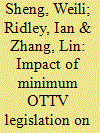

|
|
|
|
|
| Summary/Abstract |
As a measure of building envelope performance, Overall Thermal Transfer Value (OTTV) has been regulated in many countries and regions in the world, while little research is done to evaluate its city-scale effect with energy consumption. In this paper, we develop an econometric energy epidemiology model to evaluate the impact of OTTV legislations on electricity consumption using Hong Kong as an example, as Hong Kong government is one of the first adopters of OTTV regulation. For this purpose, we construct a unique database on the energy consumption of residential and commercial buildings in Hong Kong, including 39092 buildings from 1982 to 2016. Noticeable contributions to the total building energy saving could be found from historical OTTV legislations by 2016. As predicted by the model, in 2030, the annual electricity reduction can reach approximately 20000TJ without further regulation amendment, which is an important support to the “HK3030” energy target.
|
|
|
|
|
|
|
|
|
|
|
|
|
|
|
|
| 13 |
ID:
122004


|
|
|
|
|
| Publication |
2013.
|
| Summary/Abstract |
Writing for the Washington Post in April, Iraqi Prime Minister Nuri al-Maliki argued that 'the United States has not "lost" Iraq. Instead, in Iraq, the United States has found a partner for our shared strategic concerns and our common efforts on energy, economics and the promotion of peace and democracy.' A lot of people in the United States do not see it that way. They regard Iraq's democratisation efforts over the course of eight years as wasted. Many Americans view Maliki as increasingly sectarian and authoritarian, and aligned with Iran, especially in his support of Syrian President Bashar al-Assad, an important ally of Tehran. They see little of Iraq's vast oil wealth trickling down to benefit its population. They wonder whether Iraq can survive as a single state as relations between Baghdad and the Kurdistan capital of Erbil deteriorate; Sunnis block major roads in protest against Maliki; the government prevents demonstrations in Baghdad and predominantly Sunni insurgents continue to carry out bombings.
|
|
|
|
|
|
|
|
|
|
|
|
|
|
|
|
| 14 |
ID:
042943
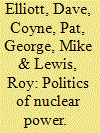

|
|
|
|
|
| Publication |
London, Pluto Press, 1978.
|
| Description |
142p.
|
| Standard Number |
0861040287
|
|
|
|
|
|
|
|
|
|
|
|
Copies: C:1/I:0,R:0,Q:0
Circulation
| Accession# | Call# | Current Location | Status | Policy | Location |
| 018642 | 333.7924/ELL 018642 | Main | On Shelf | General | |
|
|
|
|
| 15 |
ID:
160035
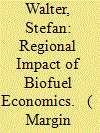

|
|
|
|
|
| Summary/Abstract |
The European Commission has developed a series of regulatory measures to introduce alternative energy technologies, including a binding target for a specified share of biofuel in petrol and diesel, in European Union (EU) member states. The instruments to achieve this goal include taxation, subsidies and legal restraints. Biofuel suffers from the problem of being uncompetitive, and the intervention addresses the price gap between conventional fuel and biofuel.
|
|
|
|
|
|
|
|
|
|
|
|
|
|
|
|
|
|
|
|
|